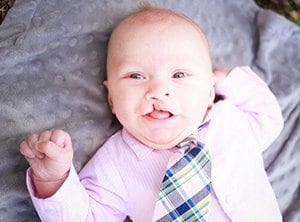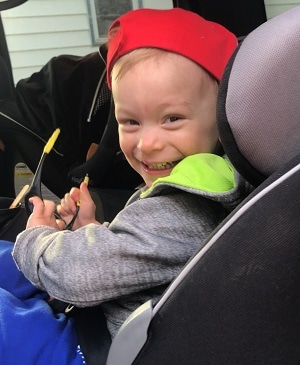Cooper Albright
The Cleft & Craniofacial Center at St. Cloud Hospital utilizes a range of services from a team of specialists to care for children with facial differences throughout the Midwest.

Ultrasounds performed at 20 weeks indicated that Cooper
would be born with a cleft lip. One of the first things his mom
shared with her friends was that CentraCare Health was
equipped to handle the birth of her son.
Like many parents who learn that their unborn child is diagnosed with cleft complications, Vanessa and Aaron Albright were anxious.
"We were so scared when we found out about Cooper's cleft," said Vanessa, who works as a registered nurse in the St. Cloud Hospital emergency room. "The 'what if's' and the unknown of any medical diagnosis can be terrifying."
However, the Albrights turned their fear into an educational opportunity for family, friends and others.
"From the outset, we wanted to be open with people and not 'hide' our son's condition," said Vanessa. "We were so thrilled to be pregnant with our first baby and we wanted everyone to be excited with us. Being open allowed people to ask questions and to learn."
Learn more about the Cleft & Craniofacial Center at St. Cloud Hospital
We understand the needs of children with craniofacial differences can be complex. We are proud that over the years our program has provided thousands of families with support and hope.
Find Out More
One of the first things Vanessa shared with her friends was that CentraCare Health was equipped to handle the birth of her son, because of both its Neonatal Intensive Care Unit (NICU) and the Cleft Center, which consists of a certified cleft palate team that provides highly specialized care to patients with cleft lip or palate.
A diagnosis of cleft lip or cleft palate, which occurs in approximately one in 700 children, is a congenital anomaly that occurs when a baby's upper lip and/or palate do not fuse during pregnancy.
"We first thought we would have to go to the cities for care and treatment," said Vanessa. "But my obstetrician reassured us that we were in good hands and that everything could be done at CentraCare."
Ultrasounds performed at 20 weeks indicated there was a 50-50 chance that the Albright's son, Cooper, would be born with a cleft palate in addition to a cleft lip that was already detected. However, Cooper was born with only a cleft lip.

Buoyed by the excellent care they've received and the
knowledge that not all cleft patients have the financial
wherewithal to get the care they need, the Albrights have
worked to bring more awareness and funding to children with
cleft conditions.
"Once we ruled out that Cooper had any palate issues, our focus was on repairing the lip so that he could eat better and close up his lip," said Mindy Ostrowski, APRN, CNP, DNP, coordinator of the pediatrics cleft team.
Cooper's lip was repaired at six months of age by Henry Yang, MD, a plastic surgeon with Midsota Plastic Surgeons, a specialty service of CentraCare Health.
"Cooper had difficulty nursing, eating and generating the suction required for drinking with a straw," said Vanessa. She received guidance from a lactation consultant to help reduce the amount of air Cooper was taking in and to help him keep food down.
"Although Cooper's care has been less extensive than if he had been born with a cleft palate, he has still needed to see a range of specialists," said Mindy. "Facilitating and coordinating that care is an important part of the process."
In addition to perinatologists and surgeons, Cooper has seen a pediatric dentist (to ensure good oral care from the start), a speech language pathologist (to work on quality and tone of speech as well as the ability to speak short sentences), an occupational therapist (to help Cooper take a bottle) and ENT specialists (for recurrent ear infections and hearing tests).

Today, Cooper is, in his mother's words, "an energetic,
resilient, fearless, kind, curious, and funny two-and-a-
half-year old." At this point there are no cleft-related
surgeries in his future. However, he will never be "done" with
cleft care, as it continues across the life span as issues arise.
"The quality of care that we've received has been second to none," said Vanessa. "Everyone we've worked with has been so gracious and kind. We've always been treated like we are family."
Today, Cooper is, in his mother's words, "an energetic, resilient, fearless, kind, curious, and funny two-and-a-half-year old." At this point there are no cleft-related surgeries in his future. However, he will never be "done" with cleft care, as it continues across the life span as issues arise.
Buoyed by the excellent care they've received and the knowledge that not all cleft patients have the financial wherewithal to get the care they need, the Albrights have worked to bring more awareness and funding to children with cleft conditions. On Cooper's first birthday, the Albrights encouraged friends and family to make a financial donation to a needy organization rather than give toys.
For his second birthday, the family raised more than $1,000 for Operation Smile, a national organization whose goal is to ensure that every child with a cleft condition has access to the medical care and the surgery they need. It's a good start toward a legacy they hope to leave.
"We want Cooper to someday be an advocate for cleft-affected children and to help others in need," said Vanessa.
"We laugh a lot now about how much we worried about Cooper before and after he was born," said Vanessa. "And that cleft that we were so scared of and worried about? We miss that cleft smile every day!"